Jake Buehler
Jake Buehler is a freelance science writer, covering natural history, wildlife conservation and Earth's splendid biodiversity, from salamanders to sequoias. He has a master's degree in zoology from the University of Hawaii at Manoa.

Trustworthy journalism comes at a price.
Scientists and journalists share a core belief in questioning, observing and verifying to reach the truth. Science News reports on crucial research and discovery across science disciplines. We need your financial support to make it happen – every contribution makes a difference.
All Stories by Jake Buehler
-
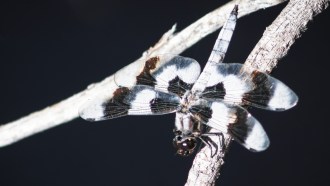 Animals
AnimalsMale dragonflies’ wax coats might protect them against a warming climate
The reflective wax, which cools males on sunny courtship flights, may also armor them against the effects of climate change.
-
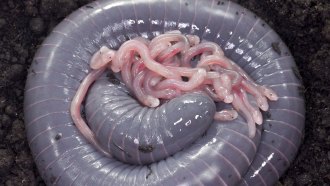 Life
LifeThis is the first egg-laying amphibian found to feed its babies ‘milk’
Similar to mammals, these ringed caecilians make a nutrient-rich milk-like fluid to feed their mewling hatchlings up to six times a day.
-
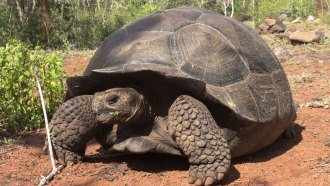 Animals
AnimalsGiant tortoise migration in the Galápagos may be stymied by invasive trees
An invasion of Spanish cedar trees on Santa Cruz Island may block the seasonal migration routes of the island's giant tortoise population.
-
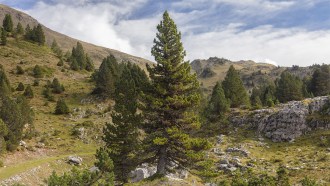 Plants
PlantsAncient trees’ gnarled, twisted shapes provide irreplaceable habitats
Traits that help trees live for hundreds of years also foster forest life, one reason why old growth forest conservation is crucial.
-
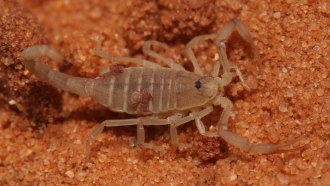 Animals
AnimalsThe first known scorpion to live with ants carries mini hitchhikers
Small arachnids hitch a ride on the scorpion, possibly to get inside food-rich ant nests.
-
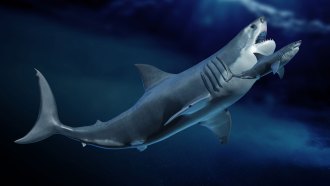 Life
LifeMegalodon, the largest shark ever, may have been a long, slender giant
The ancient shark is typically imagined with the scaled-up stout frame of a modern great white. But in life, the giant may have been more elongated.
-
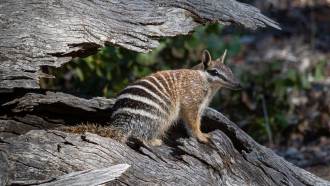 Climate
ClimateNumbats are built to hold heat, making climate change extra risky for the marsupials
New thermal imaging shows how fast numbats’ surface temperature rises even at relatively reasonable temperatures.
-
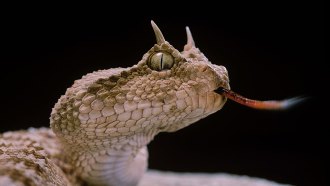 Animals
AnimalsWhy do some lizards and snakes have horns?
These reptiles’ horns can be an asset or a liability. A new study looks at the evolutionary roots of this wild headgear.
-
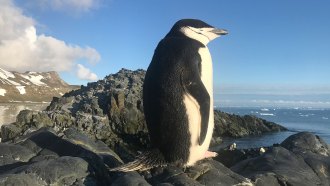 Animals
AnimalsThese nesting penguins nod off over 10,000 times a day, for seconds at a time
Micronaps net chinstrap penguins over 11 hours of sleep a day, offering some rest while staying vigilant against predators and competitors.
-
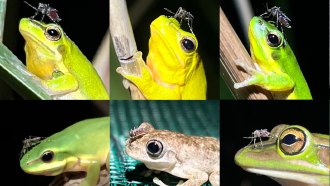 Life
LifeSome picky Australian mosquitoes may target frog nostrils for blood
The insects seem to sip from nowhere else on frogs’ bodies. Thinner skin or denser blood vessels near the nostrils might explain why.
-
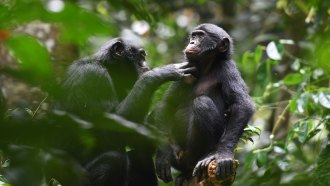 Life
LifeBonobos, like humans, cooperate with unrelated members of other groups
Cooperation between unrelated individuals in different groups without clear and immediate benefit was thought to be uniquely human. Its presence in bonobos may help explain its evolution.
-
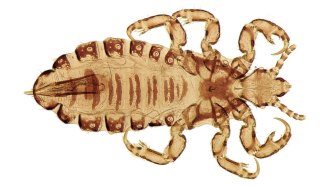 Life
LifeHead lice hitched a ride on humans to the Americas at least twice
The genes of head lice record the story of their human hosts’ global voyages.